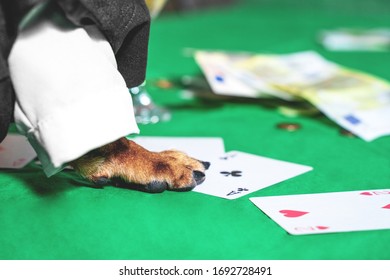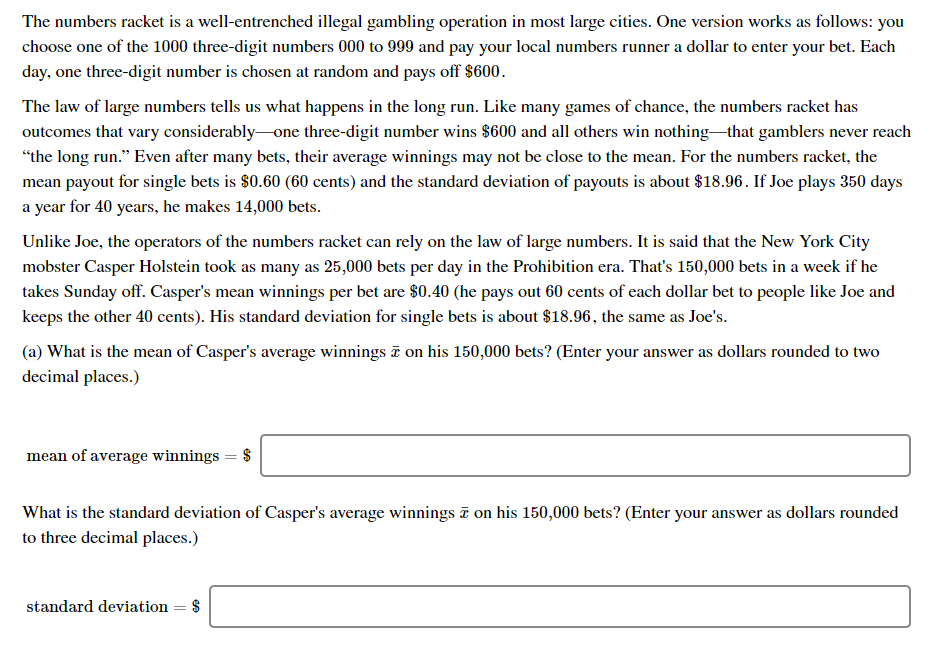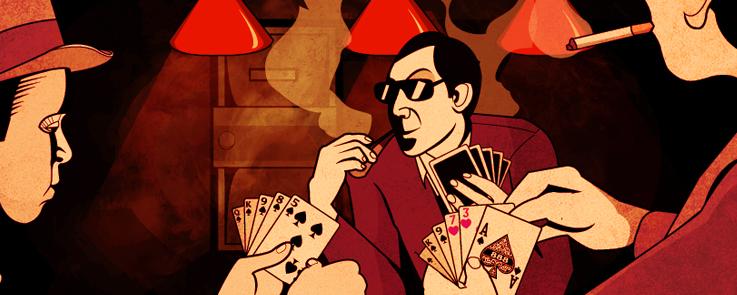How Illegal Gambling Works

Over the years, mobsters have dealt in alcohol during Prohibition, illegal drugs, prostitution and illegal gambling. Sometimes, burglaries and muggings generate income, but the capos know that their activities need a grander scale to ensure maximum profit. This is why they hijack trucks and unload entire shipments of stolen goods. Why Gambling Should Be Illegal Gambling Invites Problems. Gambling is meant to serve as a recreation. People engage in gambling activities to get rid of their problems, stress, and loneliness. But most often, the contrary happens. Gambling often turns out to be a thoughtless splurge of money and a waste of quality time. It invites problems. Even so, you should work with employment counsel to determine whether having a policy makes sense for your organization. If your company serves the public sector or is dependent on taxpayer resources, it could be worthwhile to write a policy that takes a hardline stance against gambling.


The main difference between legal and illegal gambling is that legal gambling is monitored by government inspections agencies. But more people gamble because it is legal, and although the government collects taxes on jackpots, Indian casinos and lotteries, the system is highly subject to fraud.
Gambling online is illegal (federally), but this doesn’t stop people from doing it. And even though the Organized Crime Section of the Department of Justice found that “the rate of illegal gambling in those states which have some legalized form of gambling was three times as high as those states where there was not a legalized form of gambling,” we still believe that gambling is a drain to society. Here are our Top 5 reasons why.
Reasons why gambling should be illegal
1. Gambling is subject to fraud.

How Illegal Gambling Works Online
Legalized gambling, specifically Indian gaming, is the fastest growing industry in the world, and can have a corrupting influence on state government. The governments are addicted to the revenue received from Indian gaming and lotteries. Recently there have been numerous news reports of corruption and fraud in state lotteries.
2. Availability of gambling facilities increases risk of problem gambling.
Legalized gambling makes this activity available to too many people. Governments and casinos portray this as a harmless form of entertainment. Because of the availability of legalized gambling, it is more addictive and destructive than most other addictions.
Furthermore, most citizens would not gamble illegally. Legalized gambling, therefore, entices people to gamble, who normally would not gamble at all. In states with different numbers of games, participation rates increase steadily and sharply as the number of legal types of gambling increases. In fact, legalized gambling in various states has not been a competitor to, but rather has become a stimulator of illegal gambling.

The public is assured they have the potential to win a huge jackpot. All that is required is to drive to the casino or purchase a lottery ticket. Because of the availability of gambling, many gamblers become addicted and compulsive. Interested in how to quit gambling? Read more here.
3. Problem gambling costs society billions annually.
How Illegal Gambling Works Without
The social costs of gambling addictions will eventually impact careers, physical and mental health issues, bankruptcy, divorce, crimes, and treatment. The gamblers will eventually rely on welfare or unemployment benefits, impacting the government, and the costs could reach several billions of dollars per year.
4. Gambling exploits the poor.
Evidence shows that legalized gambling often hurts and even destroys, especially those who are poor and disadvantaged. If gambling were illegal, the gambling venues would not be able to promote their lotteries, casinos, or other forms of betting and exploit people who are most vulnerable.
5. Gambling sets a double standard for governments.
State lotteries are argueably an effective way to raise taxes. Legalized gambling is a disturbing governmental policy. Governments should promote desirable qualities in the citizens and not seduce them to gamble in state-sponsored vice. When this occurs, the government contributes to the corruption of society.
Legalized gambling is a bad social policy. At a time when independent organizations estimate that there are at least 12 million compulsive gamblers, it does not make a lot of sense to have the state promoting gambling. State sponsorship of gambling makes it harder, for the compulsive gambler to reform.
Illegal Gambling Rooms
Compulsive gambling costs
In addition to the above reasons for making gambling illegals, are the economic costs that gamblers themselves incur. The average compulsive gambler has debts exceeding $80,000. Additionally, compulsive gamblers affect the lives of family, friends, and business associates. Some of the consequences of gambling include marital disharmony, divorce, child abuse, substance abuse, and suicide attempts. Other social costs surface because of family neglect, embezzlement, theft, and involvement in organized crime.
Crossing our fingers or wishing on a star will not guarantee a win. The only guarantee is, if a person is a compulsive gambler and continues to gamble, the end result is prison, insanity, or death. Whether gambling is legal or illegal, there will always be gamblers. Wanna bet?